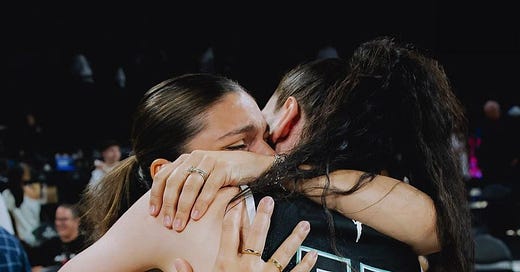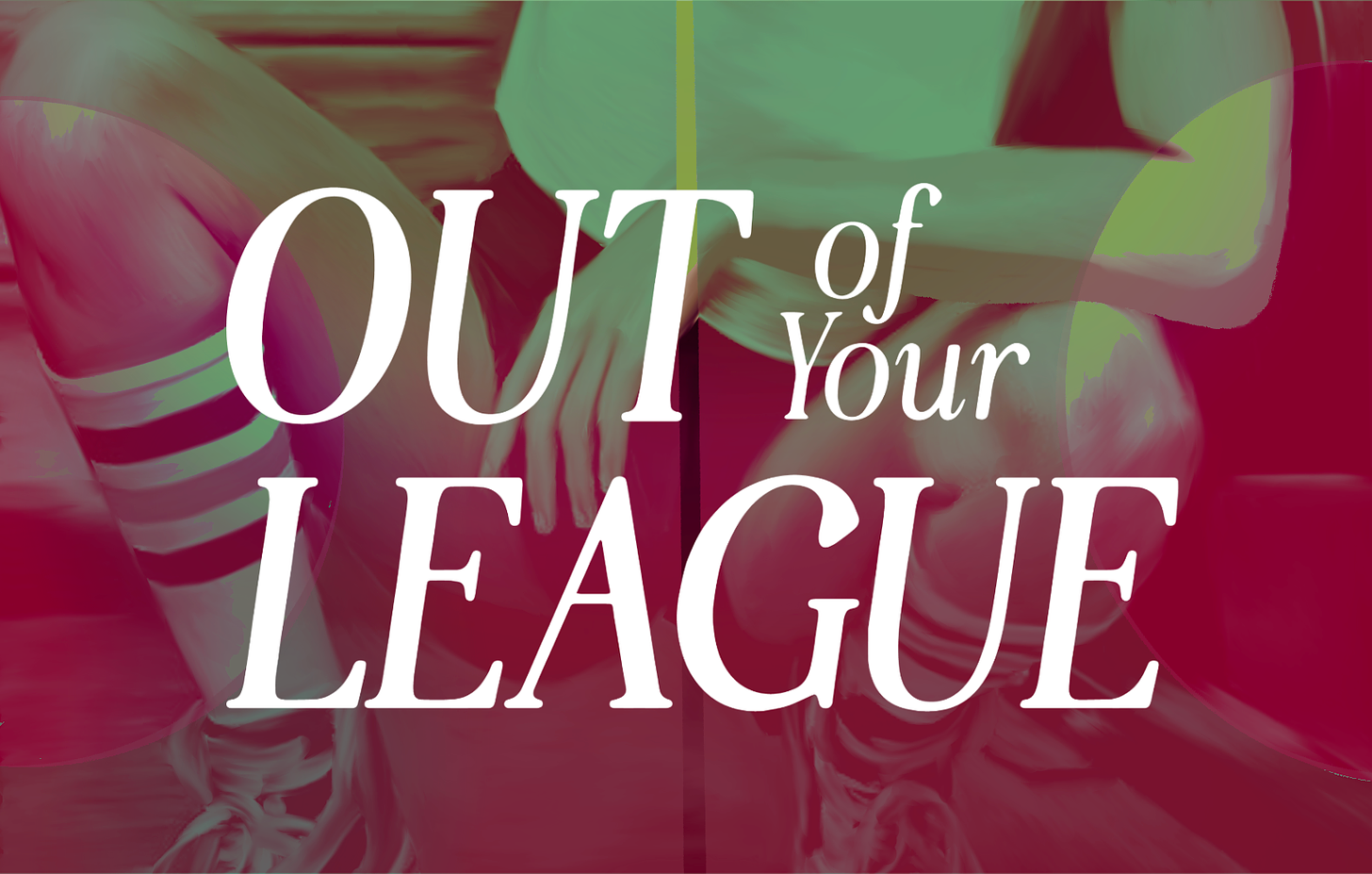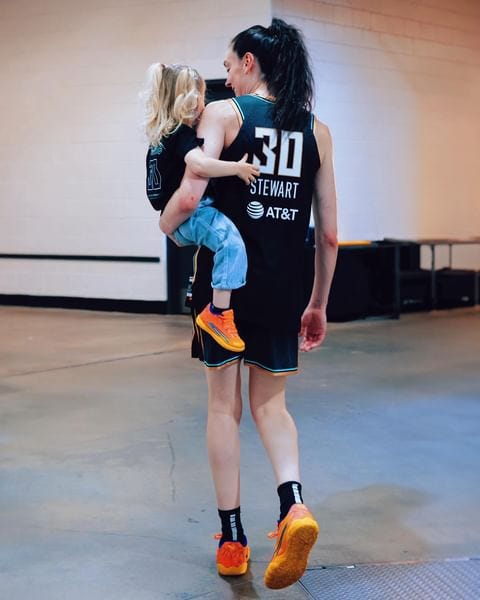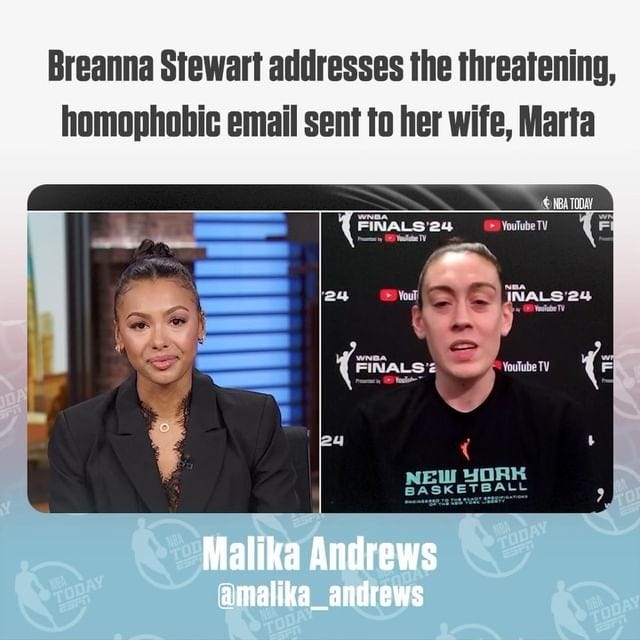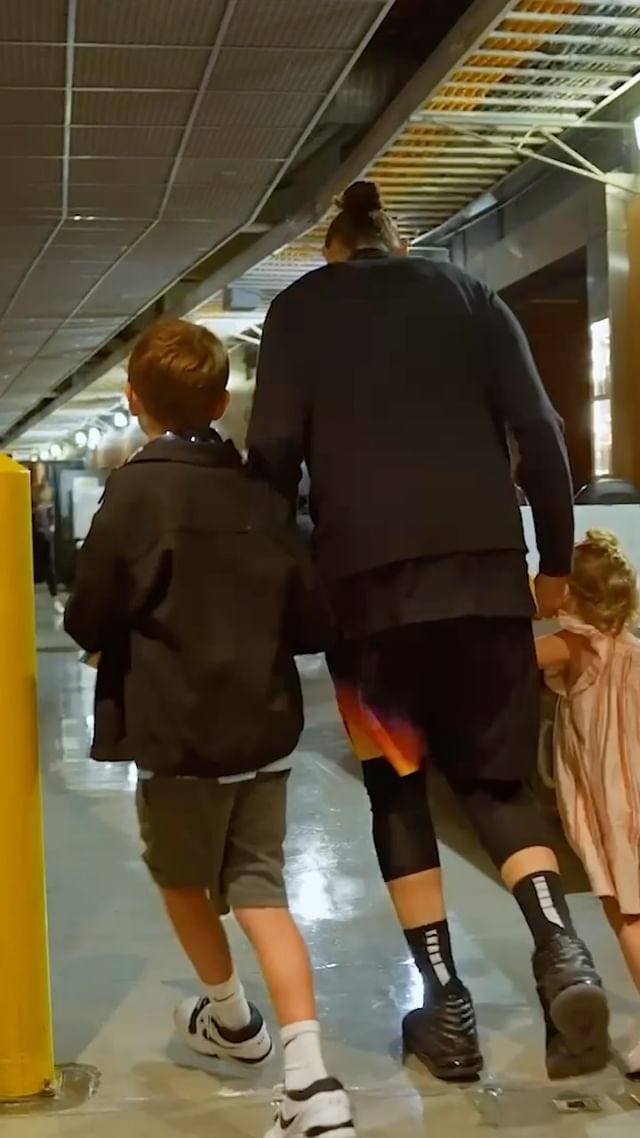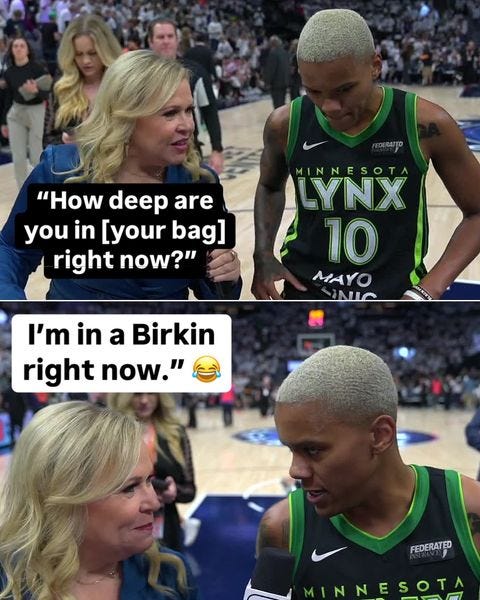I appreciate you all for being here! I am a full-time freelance sports writer. Paid subscriptions to this newsletter allow me to dedicate more time to this work. You can subscribe or upgrade here:
Game 5 of the WNBA Finals is tonight at 8 PM ET. This has been one of the best series I’ve ever seen, including not one but TWO 15-point comebacks. We’ve been having a blast in the livethreads and we’ll be there again, so feel free to join us. The chat is open to all subscribers, but after these Finals are over the livethreads will be just for paying subscribers. If you’re enjoying this community and want to keep hanging out with us, now is a great time to upgrade.
Onward!
on the perils of visibility
Following Game 2 of the WNBA Finals, the New York Post reported that Breanna Stewart and her wife, Marta Xargay Casademont, had received homophobic death threats via email. Xargay Casademont reported the threats—which I will not re-post here but which you can read in the Post article—to the NYPD. The incident occurred after the Liberty had won their first Finals game at Barclays this season, tying the series against the Minnesota Lynx at one game a piece.
Stewart and Xargay Casademont, former teammates who played pro basketball together in Russia and have been married since 2021, are a fixture of the WNBA. They are often seen together, along with their two children, and Stewart sometimes does post-game interviews while holding her older child, Ruby.
The WNBA saw exponential growth in viewership this year, with numbers up 170% from last season. Along with more eyes has come an increase in harassment and vitriol directed at the athletes. While WNBA players have been subjected to “get back in the kitchen” comments under social media posts for years, the majority of mainstream sports fans have not really been engaged or invested enough to target players directly.
But with the dueling phenomenons of Caitlin Clark and Angel Reese entering the league this year, the racially charged rhetoric that plagued the pair’s rivalry in college followed them into the W. For many conservative and right-wing viewers, Clark has become their avatar through which to project their white supremacist beliefs into a league and a sport that has largely remained insulated from the worst of it.
“We love that people are engaged in our sport but not to the point where there’s threats or harassment of homophobic comments being made,” Stewart said ahead of Wednesday’s Game 3 of the WNBA Finals against the Lynx.
Stewart and Xargay Casademont are not the only players who have received homophobic threats this season, either. Following the Connecticut Sun’s victory over the Indiana Fever in the first round of the playoffs this season, DiJonai Carrington posted a threatening email she had received, which included racial slurs, death threats, and rape threats. Carrington is in a relationship with Fever player NaLyssa Smith, which the league and sports media highlight frequently. This kind of visibility for WNBA players has been hard fought. It has been the players who have pushed the league forward every step of the way when it comes to allowing the athletes to be open with their authentic selves. At this point, approximately one-quarter of the league is openly queer.
Seeing Diana Taurasi and her wife, former teammate Penny Taylor, walk through the Phoenix Mercury’s new facilities with their two kids in tow feels like a massive deal. When Taurasi entered the league 20 years ago, the WNBA was still trying to hyper-feminize their players in what Taurasi has referred to as “hazing.” It was just two years after Sue Wicks became the first player in the league to come out publicly, and Sue Bird would cite league pressure as the reason it would take another 15 years to come out herself. To see how much has changed over the course of Taurasi’s career is really beautiful and I wonder if she even thought a moment like that would have ever been possible.
Following the playoff series between the Sun and the Fever, the WNBA released a statement addressing the increased vitriol facing their players. “While we welcome a growing fan base, the WNBA will not tolerate racist, derogatory, or threatening comments made about players, teams and anyone affiliated with the league,” the statement read. “League security is actively monitoring threat-related activity and will work directly with teams and arenas to take appropriate measures, to include involving law enforcement, as necessary.”
For many, the statement was too little, too late. Players had been complaining all season about the threats they were receiving, including Chicago Sky players like Reese, Chennedy Carter, and Isabelle Harrison—Sky players were even harassed outside their hotel back in June. The league had to have seen the narrative forming around Reese and Clark in college and should have seen its jump to the WNBA coming.
The WNBA is not the same as a men’s league and to treat it as such is a mistake—it’s a league made up of multiply-marginalized players. That means they are more vulnerable to threats, just by nature of the fact that they are women, or trans people, or Black women, or gay women, or Black gay women, or any combination of those intersections. Being unabashedly themselves in a world that is hostile to them and their identities is still a brave act, even though it shouldn’t have to be.
“We’re just continuing to let the league know,” Stewart said. “They’re handling it, but also I think for me, it’s just continuing to use this platform to make sure that everyone knows that it’s unacceptable to bring into our sport and really into the world.”
It’s clear that the visibility of athletes like Stewart, Carrington, and Taurasi means a lot to the queer fans at home. That representation is important—it models a future, it models possibility. But the onus should not be on those players to advocate for themselves and their safety. That’s where the league and its teams need to be proactive in protecting their players. WNBA commissioner Cathy Engelbert told ESPN that they are instituting a “multidimensional” approach to addressing this issue—but that action has been reactionary rather than having been preventative.
“I think that [Cathy Engelbert] and the league can just continue to make sure they’re ahead of this,” Stewart said. “If there is a way to prevent this or just be like ready for action. …There needs to be a little bit of a protocol or like a thing before the season because this year especially is when it’s really starting to happen.”
If Engelbert—a straight, cis, white woman—wants to be the commissioner of a league that is predominantly Black and largely queer and gender non-conforming, she needs to do a better job of understanding the unique challenges that players in her league face. That includes ensuring that the growth of the league and the money that is pouring in doesn’t come at the expense of the safety of the athletes who make the WNBA what it is. Without them, there is no league.
ICYMI on Out of Your League this week
Links and memes
Buckle in, this week is a doozy! We’ve got gay soccer drama, t-boy wrestling, gay line dancing, and more.
Over at Them, I published a piece about how cis women are getting backlash for their beefy bodies, and somehow, it’s because of transmisogyny.
I was on the Slate Outward podcast this week talking about the WNBA season! We dig into the celebration and tension as the WNBA’s queer roots meet mainstream success. Can the league stay true to its queer community while taking on big-time sponsors & new fans?
Courtney Williams’s very excellent quote about being so deep in her bag in Game 4 that she was in a Birkin has gone fairly viral, and for good reason. It’s a great quote and I hope Birkin gives her a campaign, and fast. But as former WNBA player Imani McGee-Stafford pointed out, white announcers switching to AAVE to talk to only certain players is not great. “We respect their regular English just as much,” McGee-Stafford said on X after that halftime interview aired. “Also they only ask certain* players questions in slang while other players get 60 Minute-level interview questions. I ont like it.”
Speaking of Game 4, Kayla McBride and Courtney Williams were so nervous during Bridget Carleton’s late-game free throws that they couldn’t even watch. Relatable!
Keep reading with a 7-day free trial
Subscribe to Out of Your League to keep reading this post and get 7 days of free access to the full post archives.


